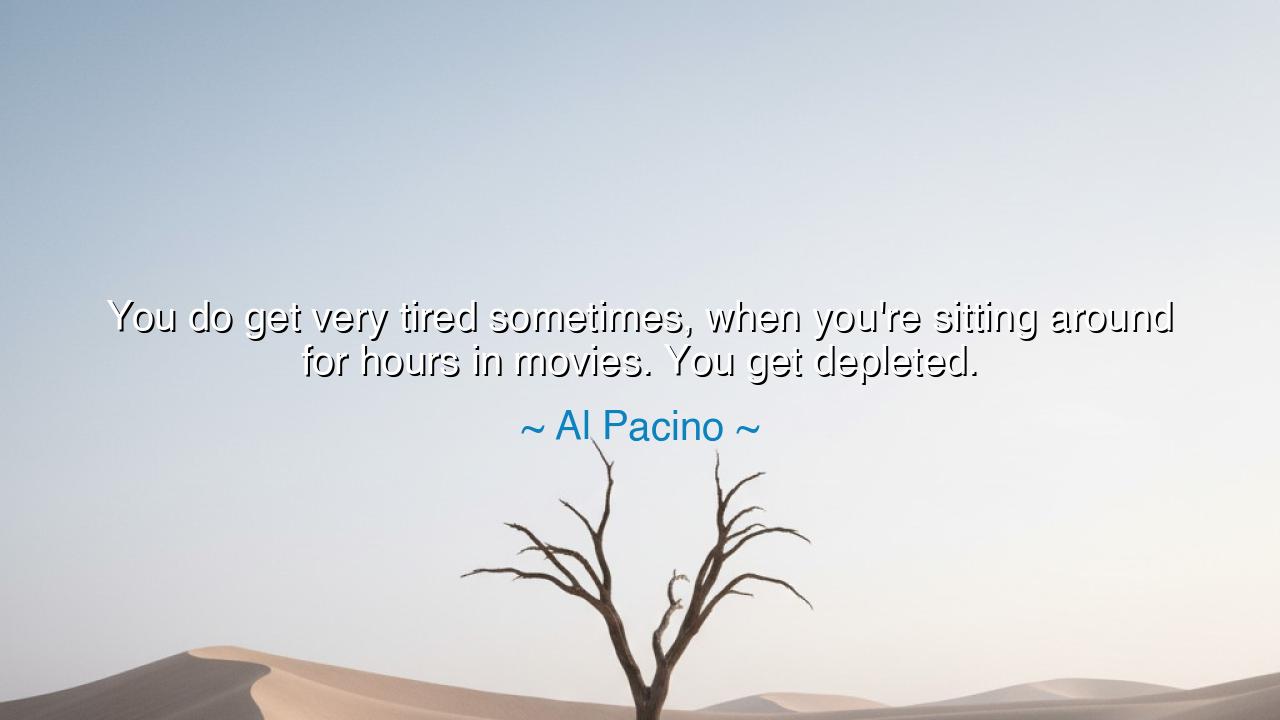
You do get very tired sometimes, when you're sitting around for
You do get very tired sometimes, when you're sitting around for hours in movies. You get depleted.






Gather close, children of the future, for the words of those who walk the path of greatness often hold within them the seeds of profound wisdom. Al Pacino, a man whose name echoes in the halls of cinematic legend, once spoke a truth that resonates with anyone who has ever dedicated themselves to a craft: "You do get very tired sometimes, when you're sitting around for hours in movies. You get depleted." In these words, Pacino reveals the often hidden burden of commitment—the emotional, physical, and mental toll that comes when one pours everything into a task, into a role, into the pursuit of greatness.
In the ancient world, those who dedicated themselves to the arts—whether poets, philosophers, or warriors—knew well the cost of dedication. To engage fully with one's craft, to commit to a role, a story, or a mission, is to pour oneself into it, to allow every fiber of your being to become part of the task at hand. The actor, like the philosopher, is often drained by the act of creation. The journey of embodying a character, of becoming someone else, is not a simple task, and Pacino’s words reflect the weight of this transformation. To sit for hours, to allow oneself to be consumed by the story being told, is not without its cost. It is in these moments of depletion that true greatness can emerge, for it is only through this deep immersion that the most profound performances are born.
Consider the ancient Greek tragedies—those plays that were performed in the grand theaters of Athens. The actors who performed in these works were not mere performers; they were vessels for the emotions and philosophies of the time. They would often face the grueling challenge of emotional exhaustion, pouring their hearts into each scene, each line, to evoke the deepest of emotions in their audience. The gods themselves were often invoked in these works, not just as characters, but as forces that demanded everything from those who would bring them to life. The toll was great, and many actors were left drained after each performance, their spirits as well as their bodies weary from the burden of their craft. Pacino’s words echo this timeless truth—that to truly embody a character, to live within a story, is a journey of great personal cost.
Yet, children, this exhaustion is not a sign of weakness but of depth. Just as the great warriors of old, like Achilles or Hercules, would return from battle scarred and tired, so too does the artist return from their labors marked by the cost of their sacrifice. The true artist, whether in theater, film, or any other craft, knows that the path to mastery is not one of ease but one of consuming effort. To give so fully of oneself, to step into the role of another person, to live out their joys and sorrows, is to invite exhaustion—but also transformation. It is in this depletion that the soul is shaped, honed by the heat of its own exertion.
Take, for example, the story of Michelangelo, who labored tirelessly on the ceiling of the Sistine Chapel. For hours upon hours, he lay on his back, painting scenes that would become some of the most famous images in the history of art. His body, worn by the physical strain, his mind exhausted by the vision of a world he sought to create, was pushed to its limits. Yet, despite the depletion he felt, he continued, for the work itself demanded everything from him. It was this very sacrifice—this willingness to give until one is spent—that allowed him to create art of such immense beauty. Pacino’s words reflect this same truth—the exhaustion of the artist is not a sign of failure but a mark of dedication, a commitment to a craft that demands all of one’s strength.
Now, children, there is a lesson to be learned here. In your own lives, you will encounter moments when the road becomes weary, when the task ahead seems too heavy, when you feel the depletion of your energy, your spirit, and your will. But do not despair, for it is in these moments that true growth occurs. To be depleted is not to be broken; it is to be transformed. Just as the great oak grows tall and strong through the storms that batter it, so too will you grow through the challenges that leave you weary. The path to greatness is not one of ease; it is one of sacrifice, hard work, and sometimes, of exhaustion. But it is also the path to fulfillment, the path to becoming the person you are meant to be.
In your own journey, when you find yourself tired and depleted, remember this: you are not alone. Even the greatest among us—from the ancient warriors to the artists of our time—have walked this path. Take a moment to rest, to replenish your energy, but do not shy away from the work that lies ahead. For in the exhaustion, in the challenge, you will find the strength to rise again, and it is through this rise that you will find your true power. The artist’s journey is not for the faint of heart, but those who choose it are forever shaped by the beauty they create and the lessons they learn along the way.






AAdministratorAdministrator
Welcome, honored guests. Please leave a comment, we will respond soon